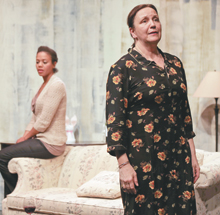
CLASS COMPARISONS From similar beginnings, different ends for Good People. |
The wood walls are streaky and weathered in the homes of both Margie (Denise Poirier) and Mike (James Noel Hoban). But where Margie's walls are aging in a working-class apartment, in the same rough South Boston neighborhood where they were raised, Mike's are the result of trendily "distressed" interior design, in an affluent Boston suburb. The Good Theater lets the same walls stand for both settings, juxtaposing the reality and the romanticizing of poverty, in its smart and sympathetic production of the David Lindsay-Abaire's drama Good People. Under the sensitive direction of Brian P. Allen, the show brings Margie and Mike back together to explore the trials, mythology, and escape plans of life in the projects.
Thirty years after Margie and Mike and last saw each other in high school, she is a single mother of a severely developmentally disabled adult daughter, and recently fired from her job as a cashier at the dollar store. She's desperate enough to pay the rent that when her friend Jean (Amy Roche) mentions having run into Mike at a Boys and Girls Club benefit (Jean was with the caterers, while Mike, now a wealthy doctor, is on the board and a Southie success-story), Margie works up the gumption to call on him for help finding work. Their reunion is a fraught and sometimes unkind one, as each broaches what the other knows, believes, and tells of the histories that brought them to where they are in life.
As the tough-tongued, hard-luck Margie, the superb Poirier makes the woman's vulnerabilities clear from the beginning. Though her Margie cusses and manipulates, she also has a wary gentleness in her gaze. In her first moments visiting with Mike, we see at once her insecurity, her pride, and her eagerness. When she joshes him, it comes across as good-willed, and when she first really upsets him — in commenting that he's become "lace-curtain" — she seems to be more excited than vindictive. For his part, Mike seems to take a genuinely friendly interest in her, despite not having returned any of her calls; Hoban's Mike comes off as a mensch rather than an uppity asshole. That's crucial to the complexity of their dynamics when Margie later intrudes upon the home Mike shares with his professor wife Kate (Noelle LuSane).
Kate, the daughter of a Georgetown doctor, has always had money, and LuSane is perfectly cast — she's poised, sleek, lovely, and eminently likeable. She makes beautiful work of how Kate notices Margie's cultural differences from herself but also how a privileged liberal takes care to avoid acknowledging her awareness of them. She also convincingly portrays Kate's pendulum of belief and loyalty, as Margie's version of history increasingly challenges the one Mike has been telling his wife and himself. As the visit degenerates, Poirier and Hoban exude both rage and a ghost of an old rapport, even after unforgivable things have been said.